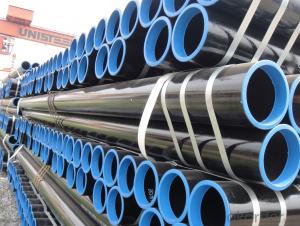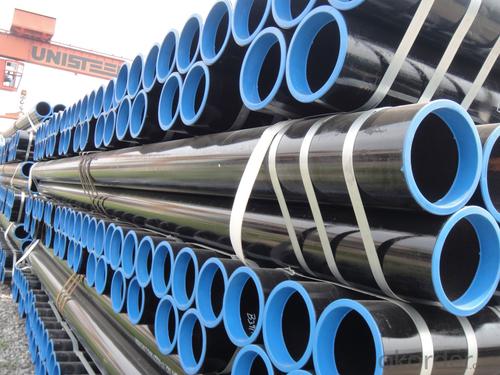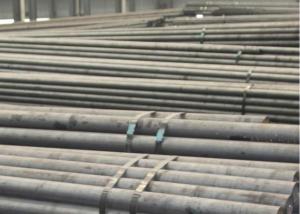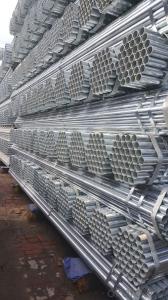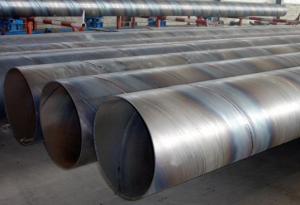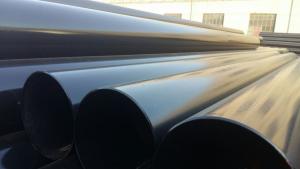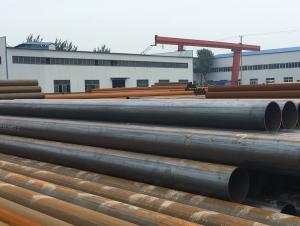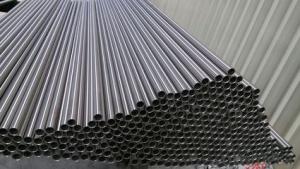ERW Welded Steel Pipe with good Quality
- Loading Port:
- China Main Port
- Payment Terms:
- TT or LC
- Min Order Qty:
- 25 m.t.
- Supply Capability:
- 9000 m.t./month
OKorder Service Pledge
OKorder Financial Service
You Might Also Like
1、Structure of ERW Steel Pipe:
ERW Steel Pipe is formed by drawing a solid billet over a piercing rod to create the hollow shell. As the manufacturing process does not include any welding, ERW Steel Pipe are perceived to be stronger and more reliable. Historically ERW Steel Pipe was regarded as withstanding pressure better than other types, and was often more easily available than welded pipe.
2、Main Features of ERW Steel Pipe:
• High manufacturing accuracy
• High strength
• Small inertia resistance
• Strong heat dissipation ability
• Good visual effect
• Reasonable price
3、ERW Steel Pipe Specification:
Standard | GB, DIN, ASTM ASTM A106-2006, ASTM A53-2007 |
Grade | 10#-45#, 16Mn 10#, 20#, 45#, 16Mn |
Thickness | 8 - 33 mm |
Section Shape | Round |
Outer Diameter | 133 - 219 mm |
Place of Origin | Shandong, China (Mainland) |
Secondary Or Not | Non-secondary |
Application | Hydraulic Pipe |
Technique | Cold Drawn |
Certification | API |
Surface Treatment | factory state or painted black |
Special Pipe | API Pipe |
Alloy Or Not | Non-alloy |
Length | 5-12M |
Outer Diameter | 21.3-610mm |
Grade | 20#, 45#, Q345, API J55, API K55, API L80, API N80, API P110, A53B |
Standard | ASME, ASTM |
1) Material:20#(ASTM A 106/A53 GRB.API5LGRB,GB),45#,16Mn,10#.
2) Specification range:OD:21.3-610mm,WT:6-70mm,length:6-12m or according to the requirement of clients.
3) Excutive standards:GB,ASME API5L.ASTM A 106/A53,Despite of the above standards,we can also supply seamless steel pipe with standard of DIN,JIS,and so on,and also develop new products according to the requirements of our clients!
4) Surface:black lacquered,varnish coating or galvanized.
5) Ends:Beveled or square cut,plastic capped,painted.
6) Packing:bundles wrapped with strong steel strip,seaworthy packing.
4、Packaging & Delivery
Packaging Details: | seaworthy package,bundles wrapped with strong steel strip |
Delivery Detail: | 15-30days after received 30%TT |
5、FAQ of ERW Steel Pipe:
①How is the quality of your products?
Our products are manufactured strictly according to national and internaional standard, and we take a test
on every pipe before delivered out. If you want see our quality certifications and all kinds of testing report, please just ask us for it.
Guaranteed: If products’ quality don’t accord to discription as we give or the promise before you place order, we promise 100% refund.
②How about price?
Yes, we are factory and be able to give you lowest price below market one, and we have a policy that “ for saving time and absolutely honest business attitude, we quote as lowest as possible for any customer, and discount can be given according to quantity”,if you like bargain and factory price is not low enough as you think, just don’t waste your time.Please trust the quotation we would give you, it is professional one.
③Why should you chose us?
Chose happens because of quality, then price, We can give you both.Additionally, we can also offer professional products inquiry, products knowledge train(for agents), smooth goods delivery, exellent customer solution proposals.Our service formula: good quality+good price+good service=customer’s trust
SGS test is available, customer inspection before shipping is welcome, third party inspection is no problem.
6.images of products:
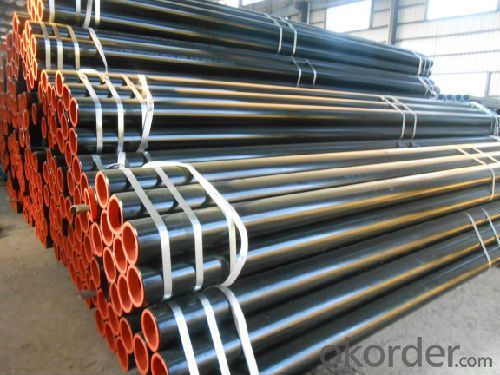
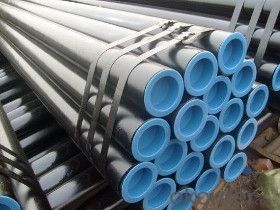
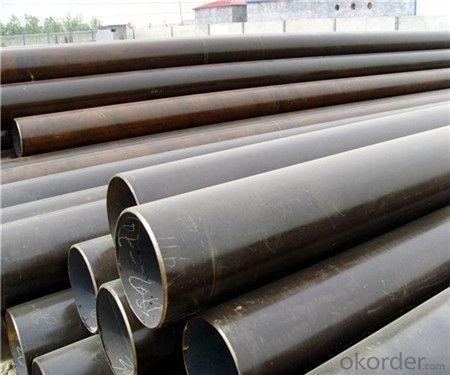
- Q: What is the tensile strength of steel pipes?
- The tensile strength of steel pipes can vary depending on the grade and type of steel used. However, in general, steel pipes have a high tensile strength. Typically, carbon steel pipes have a tensile strength range of 370 to 700 megapascals (MPa), while alloy steel pipes can have a tensile strength range of 770 to 1200 MPa. These high tensile strengths allow steel pipes to withstand high levels of pressure and stress, making them suitable for a wide range of applications such as in the construction, oil and gas, and automotive industries. It is important to note that the tensile strength of steel pipes can also be influenced by other factors such as the manufacturing process, heat treatment, and the presence of any defects or imperfections. Therefore, it is advisable to consult the specifications provided by the manufacturer or industry standards to determine the exact tensile strength of a specific steel pipe.
- Q: How do you calculate the bending moment of a steel pipe?
- The bending moment of a steel pipe can be calculated using the formula M = F * d, where M is the bending moment, F is the applied force, and d is the distance from the neutral axis to the point where the bending moment is being calculated.
- Q: How are steel pipes measured and specified?
- Steel pipes are measured and specified based on their diameter (nominal pipe size or NPS) and wall thickness (schedule or SCH). The NPS represents the internal diameter of the pipe, while the SCH indicates the thickness of the pipe walls. These measurements are crucial for ensuring proper compatibility and functionality in various applications, such as plumbing, construction, and industrial processes.
- Q: What are the common applications of steel pipes in construction?
- Steel pipes are commonly used in construction for various applications such as structural supports, plumbing systems, gas and water distribution, and underground utilities. They provide strength, durability, and resistance to corrosion, making them suitable for both above-ground and underground installations.
- Q: How are steel pipes used in the wastewater treatment industry?
- Steel pipes are commonly used in the wastewater treatment industry for various purposes such as carrying and distributing wastewater, transporting chemicals, and constructing infrastructure like tanks, pumps, and treatment units. The strength, durability, and corrosion resistance of steel pipes make them ideal for handling the harsh and corrosive nature of wastewater, ensuring efficient and reliable operation of the treatment processes.
- Q: What are the different coating options available for steel pipes?
- There are several coating options available for steel pipes, including fusion bonded epoxy (FBE) coating, polyethylene (PE) coating, polyurethane (PU) coating, and zinc coating. Each coating provides different levels of protection against corrosion and abrasion, and the choice depends on the specific application and environmental conditions.
- Q: How do steel pipes perform in marine environments?
- Steel pipes perform well in marine environments due to their high strength, corrosion resistance, and durability. They are able to withstand the harsh conditions of saltwater, waves, and extreme temperatures, making them an ideal choice for various marine applications such as offshore oil and gas drilling, shipbuilding, and coastal infrastructure. Additionally, steel pipes can be coated or galvanized to further enhance their resistance to corrosion, ensuring their long-term performance and reliability in marine environments.
- Q: What is the difference between steel pipes and cast iron soil pipes?
- Steel pipes and cast iron soil pipes are both used for plumbing and drainage systems, but they differ mainly in their material composition and durability. Steel pipes are typically made from an alloy of iron and carbon, which provides them with high strength and resistance to corrosion. On the other hand, cast iron soil pipes are made solely from iron, making them more susceptible to rust and corrosion over time. Additionally, steel pipes are generally lighter, easier to handle, and more flexible than cast iron soil pipes. However, cast iron soil pipes are known for their superior soundproofing properties, making them a preferred choice in buildings where noise reduction is crucial.
- Q: Can steel pipes be used for irrigation pumps?
- Yes, steel pipes can be used for irrigation pumps. Steel pipes are commonly used in irrigation systems due to their durability, strength, and resistance to corrosion. They can efficiently transport water from the pump to the irrigation fields, ensuring a reliable and long-lasting solution for irrigation needs.
- Q: Welded and seamless steel pipe how to distinguish?
- Different processing technology:Seamless tubes are made of quality carbon steel or alloy steel. Processing technology of seamless pipe hot rolling and cold drawing is divided into two ways, and the tube is generally based on welded.
Send your message to us
ERW Welded Steel Pipe with good Quality
- Loading Port:
- China Main Port
- Payment Terms:
- TT or LC
- Min Order Qty:
- 25 m.t.
- Supply Capability:
- 9000 m.t./month
OKorder Service Pledge
OKorder Financial Service
Similar products
Hot products
Hot Searches
Related keywords
